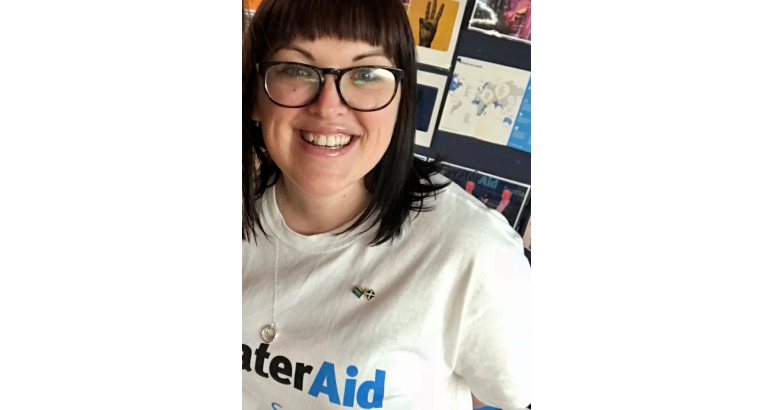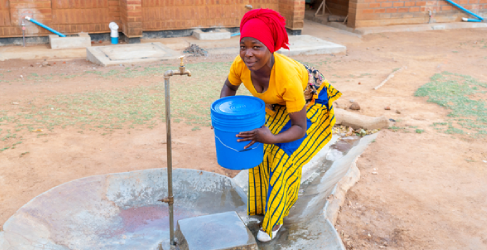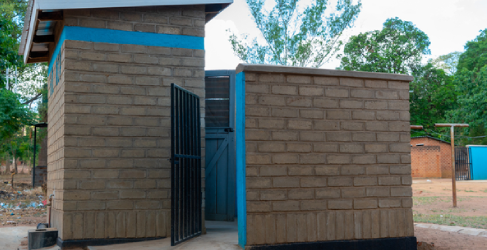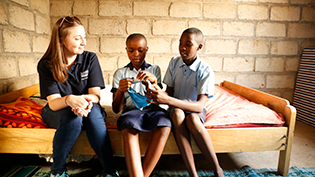BLOG: World Toilet Day - Elizabeth McKernan
18 November 2022
Decent toilets and good hygiene at the heart of healthcare
Pictured: Elizabeth McKernan Partnerships Manager at WaterAid
Imagine if you didn’t have a toilet at home, work or even in your hospital. This is a reality for 13.8 million people in Malawi - that's more than half of the entire population.
Decent toilets, together with clean water and good hygiene, keep people safe and healthy. Without them, diseases spread fast and people’s health and future opportunities are threatened. When people have no choice but to go to the toilet in the open, it risks human waste getting into the water supply. The effect can be fatal. Children are dying every day from diarrhoeal diseases caused by poor sanitation.
In the remote communities of Machinga and Zomba Districts in Malawi, many people cannot go to the toilet when and where they need or want. Without decent toilets and clean water in healthcare centres, staff cannot protect their patients from the risk of infection, and the consequences can be fatal.
Despite commitments by many governments, and the UN’s recognition of sanitation as a human right, progress is still too slow. It’s not good enough that people in some countries won’t benefit from decent toilets until 2107.
That’s why our partnership work with Scottish Water and the Scottish Government is so important. We work at every level – from communities to local and national government in Malawi – to show the difference decent toilets make to people’s lives.
Decent toilets, together with clean water and good hygiene, keep people safe and healthy. Without them, diseases spread fast and people’s health and future opportunities are threatened. When people have no choice but to go to the toilet in the open, it risks human waste getting into the water supply. The effect can be fatal. Children are dying every day from diarrhoeal diseases caused by poor sanitation.
In the remote communities of Machinga and Zomba Districts in Malawi, many people cannot go to the toilet when and where they need or want. Without decent toilets and clean water in healthcare centres, staff cannot protect their patients from the risk of infection, and the consequences can be fatal.
Despite commitments by many governments, and the UN’s recognition of sanitation as a human right, progress is still too slow. It’s not good enough that people in some countries won’t benefit from decent toilets until 2107.
That’s why our partnership work with Scottish Water and the Scottish Government is so important. We work at every level – from communities to local and national government in Malawi – to show the difference decent toilets make to people’s lives.

Marriam, 24 , at the tap stand, lifting a full bucket of water, Chikwewo Health Centre, Machinga, Malawi. Credit: WaterAid.

New bathrooms constructed under the Deliver Life 2 Project, Chikwewo Health Centre, Machinga, Malawi. Credit: WaterAid.
“When people have no choice but to go to the toilet in the open, it risks human waste getting into the water supply. The effect can be fatal. Children are dying every day from diarrhoeal diseases caused by poor sanitation.”
Elizabeth McKernan
Partnerships Manager, WaterAid Scotland and Northern Ireland
Women and girls are particularly affected
Almost two thirds of healthcare facilities in Malawi have no decent toilets, and almost one fifth does not have clean water on site.The burden of poor WASH in healthcare facilities falls disproportionately on women such as Marriam, who gave birth in a healthcare centre without adequate water, sanitation or hygiene facilities.
In Malawi, mums-to-be are required by law to come to waiting shelters, in healthcare facilities like Chikwewo, at least one month before their due date. They are accompanied by a guardian, usually a relative, and in Chikwewo, faced a life-threatening lack of basic facilities.
For midwives and those involved in maternity care, this absence is frightening. Without water, toilets and soap, health centres – the very places supposed to keep mums and babies well – become breeding grounds for the rapid spread of infectious disease.
But now, thanks to the Deliver Life project, that is no longer the case. Chikwewo healthcare facility now has clean water, decent toilets and good hygiene.
Maternal guardians, like Marriam, 24, play a crucial role in supporting pregnant women in Malawi.
“I have come to the hospital as a guardian. My elder sister is pregnant, so I have come here to provide support to her until she delivers. As a guardian I am responsible for preparing daily meals and providing moral support to the patient.
Marriam gave birth in the same healthcare centre without decent toilets, clean water or good hygiene.
“This is my second time coming here”, explains Marriam.
“I first came here two years ago when I was pregnant. A lot has changed at this [health care] facility with the coming of these new facilities. During my first visit I faced a lot of challenges.
“Now, there are new toilets, bathrooms, and taps.”
The Deliver Life Project* has constructed improved and inclusive toilets in four healthcare facilities, including Chikwewo. Over 224,000 people have gained access to decent toilets through the project’s work which covers more than 40 communities across Zomba and Machinga Districts.
Through our partnership work, we persuade decision makers that clean water, decent toilets and good hygiene go hand in hand. Investing in toilets, along with water and hygiene, saves lives, eases pressure on health services and protects patients and staff. Put simply, if people are healthy, they can get an education or work to support themselves and their families.
With your continued support, we will put decent toilets at the heart of health care centres. And we won’t stop until everyone, everywhere has what they need to stay clean and healthy, for good.
*The Deliver Life project is funded by the Scottish Government’s International Development fund and Scottish Water employee fundraising.








